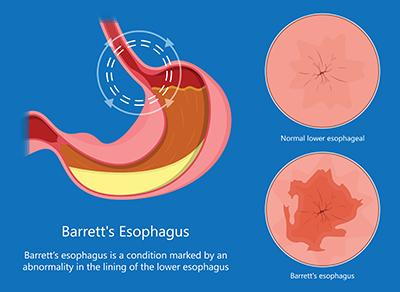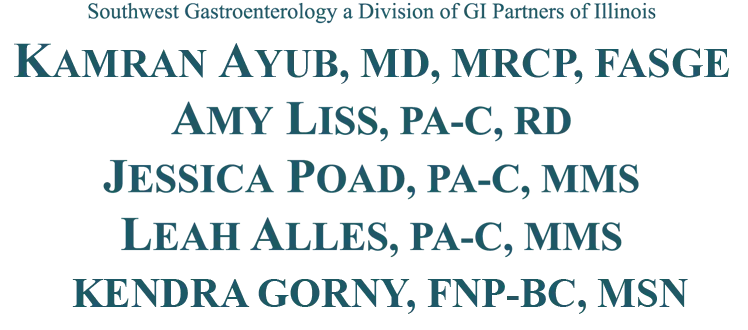678 Cedar Crossing Drive New Lenox, IL 60451
9921 Southwest Highway Oak Lawn, IL 60453
TEL: (779) 803-3756
FAX: (708) 499-2381
Barrett's Esophagus: Diagnosis & Treatment

Barrett's Esophagus: Diagnosis & Treatment
- posted: Dec. 28, 2023
- Conditions, Gastroenterology
If you suffer from GERD or gastroesophageal reflux disease, you could be at risk of developing a condition called Barrett's Esophagus. Dr. Kamran Ayub of New Lenox, Oak Lawn, Joliet, Frankfort, and Orland Park, IL explains this condition, how it’s diagnosed, and how it can be treated in the guide below.
What Is Barrett’s Esophagus?
The esophagus is a tube that travels from the mouth to the stomach. When you swallow, the food travels down this tube. Normally, the lining of the esophagus is flat and pink. However, it can become red and thicken if you suffer from GERD, leading to Barrett’s esophagus.
GERD is a condition in which stomach acid leaks back up through the esophagus, which can damage the lining. It can cause the lining’s cells to change and increase your risk of esophageal cancer.
How Is It Diagnosed?
Unfortunately, Barrett's Esophagus doesn’t produce symptoms of its own. However, if you have the symptoms of GERD, Dr. Ayub in New Lenox, Oak Lawn, Joliet, Frankfort, and Orland Park, IL will likely recommend an upper endoscopy. Symptoms of GERD include:
- Frequent heartburn
- Feeling like something is stuck in your esophagus
- Frequent sore throat
- Vomiting
- Difficulty swallowing
If you display these symptoms, an upper endoscopy can help confirm why and determine the extent of any damage to the lining of the esophagus. If the lining appears damaged, a biopsy can be performed during the endoscopy to analyze your tissues.
Treatment for Barrett’s Esophagus
There are several steps to treating this condition, depending on the severity. The first step is changes to your lifestyle and diet. Specific foods, smoking, the time you eat, and activities can all worsen acid reflux, as can being overweight. Changes to your lifestyle and diet can naturally alleviate your symptoms.
Medications can also play a role. Antacids can provide temporary relief. PPIs or proton pump inhibitors like Nexium are often used to reduce acid production.
If more conservative methods do not provide the desired results, surgery might be necessary. There are different types available according to your needs. A commonly used surgery helps tighten the barrier between the esophagus and the stomach, which helps keep stomach acid where it belongs.
There are also ablative therapies available. These are used to help destroy cells that could become cancerous and stimulate cell regeneration.
If you suffer from GERD in New Lenox, Oak Lawn, Joliet, Frankfort, and Orland Park, IL, visit Dr. Ayub for a thorough diagnosis and to determine if you have or are at risk of developing Barrett’s Esophagus. Call (779) 803-3756 to schedule your appointment today.

Barrett's Esophagus: Diagnosis & Treatment
- posted: Dec. 28, 2023
- Conditions, Gastroenterology
If you suffer from GERD or gastroesophageal reflux disease, you could be at risk of developing a condition called Barrett's Esophagus. Dr. Kamran Ayub of New Lenox, Oak Lawn, Joliet, Frankfort, and Orland Park, IL explains this condition, how it’s diagnosed, and how it can be treated in the guide below.
What Is Barrett’s Esophagus?
The esophagus is a tube that travels from the mouth to the stomach. When you swallow, the food travels down this tube. Normally, the lining of the esophagus is flat and pink. However, it can become red and thicken if you suffer from GERD, leading to Barrett’s esophagus.
GERD is a condition in which stomach acid leaks back up through the esophagus, which can damage the lining. It can cause the lining’s cells to change and increase your risk of esophageal cancer.
How Is It Diagnosed?
Unfortunately, Barrett's Esophagus doesn’t produce symptoms of its own. However, if you have the symptoms of GERD, Dr. Ayub in New Lenox, Oak Lawn, Joliet, Frankfort, and Orland Park, IL will likely recommend an upper endoscopy. Symptoms of GERD include:
- Frequent heartburn
- Feeling like something is stuck in your esophagus
- Frequent sore throat
- Vomiting
- Difficulty swallowing
If you display these symptoms, an upper endoscopy can help confirm why and determine the extent of any damage to the lining of the esophagus. If the lining appears damaged, a biopsy can be performed during the endoscopy to analyze your tissues.
Treatment for Barrett’s Esophagus
There are several steps to treating this condition, depending on the severity. The first step is changes to your lifestyle and diet. Specific foods, smoking, the time you eat, and activities can all worsen acid reflux, as can being overweight. Changes to your lifestyle and diet can naturally alleviate your symptoms.
Medications can also play a role. Antacids can provide temporary relief. PPIs or proton pump inhibitors like Nexium are often used to reduce acid production.
If more conservative methods do not provide the desired results, surgery might be necessary. There are different types available according to your needs. A commonly used surgery helps tighten the barrier between the esophagus and the stomach, which helps keep stomach acid where it belongs.
There are also ablative therapies available. These are used to help destroy cells that could become cancerous and stimulate cell regeneration.
If you suffer from GERD in New Lenox, Oak Lawn, Joliet, Frankfort, and Orland Park, IL, visit Dr. Ayub for a thorough diagnosis and to determine if you have or are at risk of developing Barrett’s Esophagus. Call (779) 803-3756 to schedule your appointment today.
Our Regular Schedule
Kamran Ayub, MD, MRCP, FASGE
Monday
9:00 am - 5:00 pm
Tuesday
9:00 am - 5:00 pm
Wednesday
9:00 am - 5:00 pm
Thursday
9:00 am - 5:00 pm
Friday
9:00 am - 5:00 pm
Saturday
Closed
Sunday
Closed

